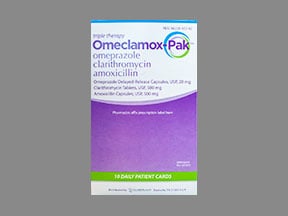
Omeclamox-pak Coupons & Savings Card – Discount Prices from $765.64
My prescription
Edit
500-500-20MG, Omeclamox-pak (80 Miscellaneous)
Select pharmacy

CVS
$765.64
COUPON PRICE
Walmart
$778.51
COUPON PRICE
Walgreens
$783.50
COUPON PRICE
Albertsons
$783.95
COUPON PRICEOmeclamox-pak savings card
Show this card to your pharmacist
CVS
$765.64
BIN
ID
PCN
GRP
019876
LHD7074040
CHIPPO
LHX
Powered by
More prescriptions for duodenal ulcer
More prescriptions for duodenal ulcer
Price history for Omeclamox-pak
80 Miscellaneous, 500-500-20MG
Average retail price for Omeclamox-pak
Average SaveHealth price for Omeclamox-pak
Our price history data is based on aggregated prescription data collected from participating pharmacies in America. Our prescription data updates daily to reflect the latest price changes. If you notice a missing data point, it means there wasn't sufficient data available to generate a monetary value for that date.
*Retail prices are based on pharmacy claims data, and may not be accurate when we don't have enough claims.
Omeclamox-pak dosage forms
Dosage Quantity Price from Per unit 500-500-20MG 80 Miscellaneouses $765.64 $9.57 500-500-20MG 8 Miscellaneouses $60.76 $7.59
| Dosage | Quantity | Price from | Per unit |
|---|---|---|---|
| 500-500-20MG | 80 Miscellaneouses | $765.64 | $9.57 |
| 500-500-20MG | 8 Miscellaneouses | $60.76 | $7.59 |
What is Omeclamox-Pak used for?
Omeclamox-Pak is used for the treatment of Helicobacter pylori infection and duodenal ulcer disease. It is a combination therapy that includes omeprazole, clarithromycin, and amoxicillin, which work together to eradicate the infection and promote healing of the ulcer.
How much does Omeclamox-Pak cost?
The cost of Omeclamox-Pak can vary depending on the pharmacy, location, and whether the patient has insurance coverage. Without insurance, the price can be relatively high. It is recommended to check with local pharmacies for the most accurate and up-to-date pricing. Additionally, patients may want to inquire about any available discounts or generic alternatives.
What are the side effects of triple antibiotics for H. pylori?
The triple antibiotic therapy for H. pylori typically includes a combination of two antibiotics, such as amoxicillin and clarithromycin, along with a proton pump inhibitor. Common side effects of this treatment may include:- Nausea- Diarrhea- Taste disturbances- Abdominal pain- HeadacheLess common side effects can include allergic reactions, such as rash or itching, and more severe gastrointestinal issues. It is important for patients to discuss any side effects with their healthcare provider.
How much does Omeclamox cost?
The cost of Omeclamox can vary depending on factors such as the pharmacy, location, and whether the patient has insurance coverage. It is recommended to check with local pharmacies for the most accurate and up-to-date pricing. Additionally, patients may want to inquire about generic options or discount programs that could help reduce the cost.
What is the H. pylori treatment combo pack?
The H. pylori treatment combo pack typically includes a combination of antibiotics and a proton pump inhibitor (PPI). Commonly, it consists of clarithromycin, amoxicillin, and a PPI such as omeprazole or lansoprazole. This combination is used to eradicate Helicobacter pylori infection and reduce stomach acid, promoting healing of the stomach lining.
